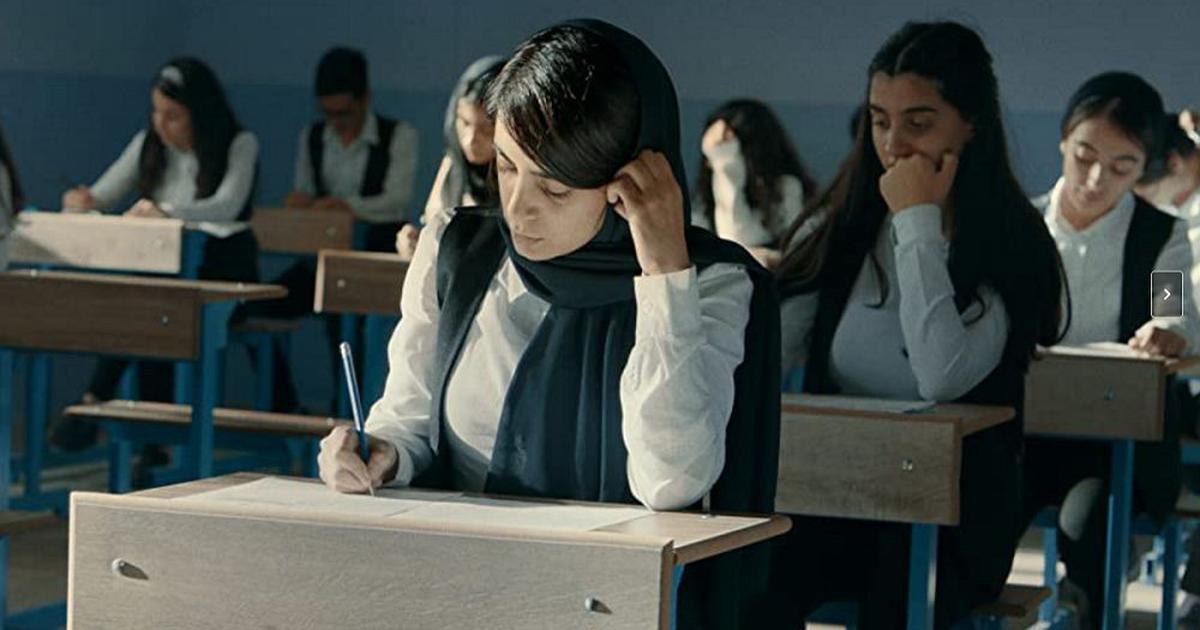Shawkat Amin Korki’s film The Exam (2021) opens to a scene of a girl, Rojin (Vania Salar), overlooking a vast body of water, tears streaming down her face. Her heartbreak, as she mourns her missing fiancé, is the focus of this emotive film set in eastern Kurdistan, eastern city of Sulaymaniyah, post Iraq war.
The scars of war are everywhere in the dilapidated town. As is Rojin’s determination to change her lot by studying for academic exams. At first, this premise seems pro-feminist. Education leads to emancipation. The film is a bildungsroman of sorts, following this young female protagonist’s growth from fragility to inner strength.
Read: The Stranger, Thomas M. Wright: ‘This film needed moral perspective’
But the trope of a tragic young girl, keening after her man lost at sea doesn’t strike me as progressive as I’d hoped for a film that centres female narrative in Kurdistan and makes me ponder, is it centring their authentic narratives at all?
Throughout, women are frequently depicted (unabashedly) as the tea-makers, dragging their feet through stone markets, their heads downcast, and their eyes averting their surroundings.
A female Kurdish filmmaker friend of mine, who prefers not to be named, told me this depiction is common in her male-dominated field as filmmakers are invariably thinking about the appeal of their work to Western audiences, who sometimes have preordained ideas of ‘Middle-Eastern political backwardness’ and more conservative Arab audiences who enshrine those values. ‘It may be their Kurdistan …’ (for those male filmmakers) ‘but it’s not my Kurdistan’, she tells me.
And indeed, many of the female members of my own Kurdish family ‘wear the pants’ in ways that are unlike Korki’s picture here. The danger of stereotypes is of course further stigmatism and the reinforcement of fear. I’m not saying Kurdish women are all free and powerful, but just that we are not all so subjugated by crushing mores, family expectation and old-fashioned ideals, as Korki’s film might suggest, having no other frame of reference to go by.
Read: MIFF 2022: program highlights at the Melbourne International Film Festival
At many points in the dialogue, Rojin is reminded that ‘if you don’t pass the exam, you have to get married’ (her father has arranged a suitor should her academic ambitions fall through). Her sister Shilan (Avan Jamal), is trapped in a loveless marriage to a possessive husband Sardar (Hussein Hassan Ali), and wants to save Rojin from a similar fate. To add insult to injury, their widowed father Aziz (Hama Rashid Haras) has found a bride, but on the condition that Rojin is also married.
Shilan’s plan to secure Rojin’s future spurs her to make a deal with property developer Shamal (Kawar Qadir) and his sidekick Mr. Engineer (Hushyar Nerwayi). Their business is located in the basement of a semi-derelict English-language school on the outskirts of town.
The dodgy pair run a lucrative business helping students cheat in academic exams. For a princely sum, Shilan will be given information when the exam commences and will call Rojin, via Bluetooth to divulge the answers.
Shilan forfeits jewelry, as many other families have done. The tension escalates as Shilan becomes increasingly implicated in the extortion, causing her to be embroiled in a tense criminal web.
The Exam is suspenseful, and has acerbic humour in parts, while compelling audiences to think, even cursorily, about feminism in the Middle-East. There are some ethical questions raised by the film. Is the only way, when faced with gender entrenchment and classism, to cheat the system? But I feel these women’s narratives could have been unraveled more authentically with a female filmmaking team, something becoming increasingly apparent in mainstream as well as cultural cinema.
The Exam achieves success as a suspenseful drama for broad audiences and it is so good seeing Kurdish cinema as part of the current Melbourne International Film Festival. I hope this is taken further with Kurdish female filmmakers in the future, forwarding authentic Kurdish women’s narratives and voices.
The Exam is screening as part of MIFF 2022. Find out more.
Actors:
Director:
Format: Movie
Country:
Release:





